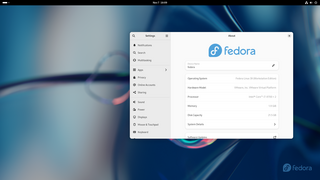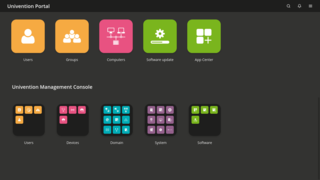
A Linux distribution is an operating system made from a software collection that includes the Linux kernel and often a package management system. Linux users usually obtain their operating system by downloading one of the Linux distributions, which are available for a wide variety of systems ranging from embedded devices and personal computers to powerful supercomputers.
In computing, a solution stack or software stack is a set of software subsystems or components needed to create a complete platform such that no additional software is needed to support applications. Applications are said to "run on" or "run on top of" the resulting platform.
OS-level virtualization is an operating system (OS) virtualization paradigm in which the kernel allows the existence of multiple isolated user space instances, called containers, zones, virtual private servers (OpenVZ), partitions, virtual environments (VEs), virtual kernels, or jails. Such instances may look like real computers from the point of view of programs running in them. A computer program running on an ordinary operating system can see all resources of that computer. However, programs running inside of a container can only see the container's contents and devices assigned to the container.

EnterpriseDB (EDB), a privately held company based in Massachusetts, provides software and services based on the open-source database PostgreSQL, and is one of the largest contributors to Postgres. EDB develops and integrates performance, security, and manageability enhancements into Postgres to support enterprise-class workloads. EDB has also developed database compatibility for Oracle to facilitate the migration of workloads from Oracle to EDB Postgres and to support the operation of many Oracle workloads on EDB Postgres.

Oracle Linux is a Linux distribution packaged and freely distributed by Oracle, available partially under the GNU General Public License since late 2006. It is compiled from Red Hat Enterprise Linux (RHEL) source code, replacing Red Hat branding with Oracle's. It is also used by Oracle Cloud and Oracle Engineered Systems such as Oracle Exadata and others.

Fedora Linux is a Linux distribution developed by the Fedora Project. It was originally developed in 2003 as a continuation of the Red Hat Linux project. It contains software distributed under various free and open-source licenses and aims to be on the leading edge of open-source technologies. It is now the upstream source for CentOS Stream and Red Hat Enterprise Linux.

libvirt is an open-source API, daemon and management tool for managing platform virtualization. It can be used to manage KVM, Xen, VMware ESXi, QEMU and other virtualization technologies. These APIs are widely used in the orchestration layer of hypervisors in the development of a cloud-based solution.

Linux Containers (LXC) is an operating-system-level virtualization method for running multiple isolated Linux systems (containers) on a control host using a single Linux kernel.

Criticism of desktop Linux is a history of comment on the perceived shortcomings of the Linux operating system when installed on desktop computers. These criticisms have been aimed at the plethora of issues and lack of consistency between Linux distributions, their usefulness and ease of use as desktop systems for general end users, driver support and issues with multi-media playback and audio development.
Alpine Linux is a Linux distribution designed to be small, simple, and secure. It uses musl, BusyBox, and OpenRC instead of the more commonly used glibc, GNU Core Utilities, and systemd. This makes Alpine one of few Linux distributions not to be based on the GNU Core Utilities.

OpenShift is a family of containerization software products developed by Red Hat. Its flagship product is the OpenShift Container Platform — a hybrid cloud platform as a service built around Linux containers orchestrated and managed by Kubernetes on a foundation of Red Hat Enterprise Linux. The family's other products provide this platform through different environments: OKD serves as the community-driven upstream, Several deployment methods are available including self-managed, cloud native under ROSA, ARO and RHOIC on AWS, Azure, and IBM Cloud respectively, OpenShift Online as software as a service, and OpenShift Dedicated as a managed service.

Univention Corporate Server (UCS) is a server operating system derived from Debian with an integrated management system for the central and cross-platform administration of servers, services, clients, desktops and users as well as virtualized computers operated in UCS. In addition to the operation of local, virtual instances, UCS can also be operated in cloud environments. Via the integration of the open source software Samba 4, Univention also supports the functions provided in many companies by Microsoft Active Directory for the administration of computers operated with Microsoft Windows. UCS-based components and UCS-certified, third-party products can be installed via the Univention App Center. UCS provides all App Center applications with a runtime environment and services for the operation including a central, consistent management of the apps. Docker containers can also be run on UCS systems and several of the apps available in the App Center are Docker-based.
Docker is a set of platform as a service (PaaS) products that use OS-level virtualization to deliver software in packages called containers. The service has both free and premium tiers. The software that hosts the containers is called Docker Engine. It was first released in 2013 and is developed by Docker, Inc.
Kubernetes is an open-source container orchestration system for automating software deployment, scaling, and management. Originally designed by Google, the project is now maintained by a worldwide community of contributors, and the trademark is held by the Cloud Native Computing Foundation.

Mirantis Inc. is a Campbell, California, based B2B open source cloud computing software and services company. Its primary container and cloud management products, part of the Mirantis Cloud Native Platform suite of products, are Mirantis Container Cloud and Mirantis Kubernetes Engine. The company focuses on the development and support of container and cloud infrastructure management platforms based on Kubernetes and OpenStack. The company was founded in 1999 by Alex Freedland and Boris Renski. It was one of the founding members of the OpenStack Foundation, a non-profit corporate entity established in September, 2012 to promote OpenStack software and its community. Mirantis has been an active member of the Cloud Native Computing Foundation since 2016.
Docker, Inc. is an American technology company that develops productivity tools built around Docker, which automates the deployment of code inside software containers. Major commercial products of the company are Docker Hub, a central repository of containers, Docker Desktop, a GUI application for Windows and Mac to manage containers. The historic offering was Docker Enterprise PaaS business, acquired by Mirantis. The company is also an active contributor to various CNCF projects, such as containerd and runC. The main open source offering of the company are Docker Engine and buildkit which are rebranded under the Moby umbrella project. The core specification, Dockerfile, still includes the company trademark, however.
Container Linux is a discontinued open-source lightweight operating system based on the Linux kernel and designed for providing infrastructure for clustered deployments while focusing on automation, ease of application deployment, security, reliability, and scalability. As an operating system, Container Linux provided only the minimal functionality required for deploying applications inside software containers, together with built-in mechanisms for service discovery and configuration sharing.
The Cloud Native Computing Foundation (CNCF) is a Linux Foundation project that was founded in 2015 to help advance container technology and align the tech industry around its evolution.

Collabora Online is an open source online office suite built on LibreOffice Technology, enabling web-based collaborative real-time editing of word processing documents, spreadsheets, presentations, and vector graphics. Optional apps are available for desktops, laptops, tablets, smartphones, and Chromebooks.










